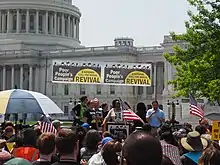Poor People's Campaign: A National Call for a Moral Revival
Poor People's Campaign: A National Call for a Moral Revival is an American anti-poverty campaign led by William Barber II and Liz Theoharis.[1][2]
 | |
| Named after | Poor People's Campaign |
|---|---|
| Location |
|
Co-chair | William Barber II |
Co-chair | Liz Theoharis |
| Website | www |
Goals and mission

According to Jelani Cobb, writing in The New Yorker, the movement demands "federal and state living-wage laws, equity in education, an end to mass incarceration, a single-payer health-care system, and the protection of the right to vote."[3] The aim of the campaign centers on connecting movements that seem to be interconnected, such as racism, sexism, anti-Native American policies, ableism, and classism.[4]
The campaign takes its name from the original 1968 Poor People's Campaign, which was an effort to gain economic justice for poor people in the United States, organized by Martin Luther King Jr. and the Southern Christian Leadership Conference (SCLC), and carried out under the leadership of Ralph Abernathy in the wake of King's assassination.[5]
Barber has explained the movement saying, "This is about the moral center. This is about our humanity."[1] The campaign is supported by the International Union, United Automobile, Aerospace, and Agricultural Implement Workers of America (UAW).[6]
40 days of civil disobedience
They performed "40 days of coordinated action in the spring of 2018 at statehouses across the US", starting in May.[1][5][7] The main event was hosted at the National Mall in Washington, DC. The focus of the events were on the "triple evils": racism, poverty, and militarism.[8] Thousands of people marched in Washington DC, coming from at least 32 states.[7] More than 20 state's representatives were called on stage, along with representatives for Native Americans living on reservations. People from as far as Alaska joined the crowd.[9] People within the movement are also participants in other organizations who feel that their goals are being pushed forward by the campaign, such as "Fight for $15", who aims to raise the national minimum wage to a living wage; Our Children, Our Future, a West Virginian group including Amy Jo Hutchison that organizes parents of children to fight against poverty; and Voices of Community Activist and Leaders - New York, a group from Harlem that builds power for New Yorkers who are impacted by HIV/AIDS, mass incarceration, drug wars, and homelessness.[9]
On May 21, 2018, 21 protesters were arrested in Nashville, Tennessee.[10] This protest marked the 50 year anniversary of the Poor People's Campaign's building of a shantytown called Resurrection City. Barber said of the event, “This is not a commemoration of what happened 50 years ago. This is a reenactment and reinauguration.”[11]
On June 4, 2018, 16 protesters were arrested in Topeka, Kansas.[12]
After a Supreme Court decision determining that purging inactive Ohio voters from the registration lists is constitutional in Husted v. Randolph Institute, Barber and Theoharis were arrested and detained for 26 hours at the Supreme Court. A week prior, Dr. Theoharis was arrested in Lansing, Michigan.[13]
On June 23, the campaign hung two banners on both sides of a raised stage at the National Mall that read, "Fight Poverty Not The Poor."[9]
More than 2,000 people were arrested nationwide during the 40 day protest.[9] Protesters participated in a variety of nonviolent direct actions, including "stopp[ing] traffic and petition[ing] state legislatures."[9]
Comparisons to the 1960s Poor People's Campaign
Barber has stated, "We have these mythologies about the civil rights movement, about what it took to bring about change in America, but none of that happened overnight. You need to have a long-term vision. This right here, this is only our foundation."[14]
The new movement aims to address the issues that Martin Luther King Jr. spoke against in his original campaign.[15]
References
- Heuvel, Katrina vanden (5 December 2017). "Opinion - A new Poor People's Campaign wants to change how society defines morality". Retrieved 15 April 2018 – via www.washingtonpost.com.
- "Rev. Barber & Rev. Theoharis: It's Time to Fight for America's Soul". Time. Retrieved 15 April 2018.
- Cobb, Jelani. "William Barber Takes on Poverty and Race in the Age of Trump". The New Yorker. Retrieved May 9, 2018.
- "The Poor People's Campaign Is Just Getting Started". Talk Poverty. 2018-06-26. Retrieved 2018-11-03.
- Barber, Reverend William; Theoharis, Dr Liz (15 April 2018). "America once fought a war against poverty – now it wages a war on the poor". the Guardian. Retrieved 15 April 2018.
- "UAW Leader on Civil Rights and Black Labor | | BlackPressUSA". www.blackpressusa.com. Retrieved 2018-11-03.
- II, William J. Barber. "America's Moral Malady". The Atlantic. Retrieved 2018-11-03.
- "Opinion | A new Poor People's Campaign wants to change how society defines morality". Washington Post. Retrieved 2018-11-03.
- Kaufmann, Greg. "The Poor People's Campaign Is Just Getting Started | The Nation". ISSN 0027-8378. Retrieved 2018-11-03.
- Allison, Natalie (May 22, 2018). "21 Poor People's Campaign demonstrators blocking traffic arrested in downtown Nashville". The Tennessean. Retrieved May 22, 2018.
- Thebault, Reis (June 23, 2018). "In D.C., the Poor People's Campaign hits 50 and looks ahead". The Washington Post.
- Moore, Katie (June 4, 2018). "16 arrested in fourth week of Poor People's Campaign protests in Topeka". The Topeka Capital-Journal. Retrieved June 5, 2018.
- Stieb, Matt. "The Return of the Poor People's Campaign". Intelligencer. Retrieved 2018-11-03.
- "50 years later, the new Poor People's Campaign lays out a political strategy beyond its Washington rally". Washington Post. Retrieved 2018-11-03.
- "The Poor People's Campaign Seeks To Complete Martin Luther King's Final Dream". NPR.org. Retrieved 2018-11-03.